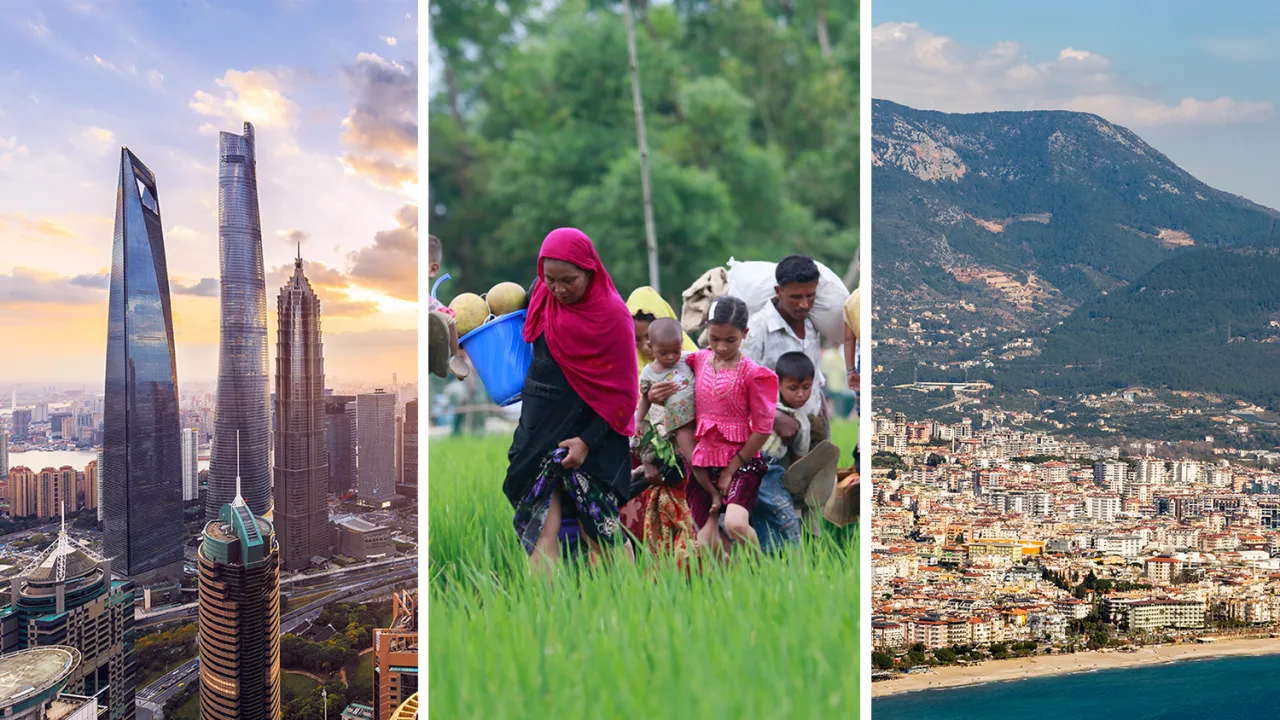Finnvera’s Countries and markets review 1/2021: China recovers from the pandemic, Turkish economy faces difficulties – Myanmar opens and shuts

Published date
The export market may be heading for a reshuffle as the COVID-19 pandemic recedes. Currently, however, there are major variations in the pace of recovery between countries. One of the winners is China, which recovered from the pandemic rather quickly. Turkey, on the other hand, is struggling with a weakening currency and monetary policy problems. Turkey is a traditional export market for Finnish companies, which has also been reflected in the demand for Finnvera’s export credit guarantees. In late 2020, Turkey was in the top ten of Finnvera’s country exposure. Besides the pandemic, global economic and political uncertainty has also been driven by other reasons. Myanmar, which was preparing to open up to international trade, is currently in the grip of a military coup.
Increasing economic and political uncertainty typically drives a need for financing guaranteed by export credit agencies. The task of these agencies, including Finnvera, is to share the risk and continue to provide export financing for promising projects of companies as far as possible. This means that the situation in Turkey, China and Myanmar will be monitored from the viewpoint of corporate financing.
Turkey – economic growth in Europe creates export opportunities but the Turkish economy is unstable
Measures aimed at offsetting the effects of the COVID-19 pandemic led to a slight growth in the Turkish economy in 2020, whereas the second wave of the pandemic forced the country to reintroduce tighter restrictions late in the year. One of the most important sectors for the entire Turkish economy is tourism, which met with difficulties during the pandemic. The prospects have been improved by the initiation of coronavirus vaccinations in Turkey and in tourists’ home countries. The recovery of economic growth in Europe in 2021 improves the growth potential of export companies. It is hoped that economic recovery will gradually also boost employment, whereas the number of bankruptcies is expected to go up. The country's economic difficulties have affected the popularity of the government. Getting the pandemic under control has proven more difficult than anticipated as the number of cases increased again in the spring.
The external value of the Turkish lira fell in 2020, and the same trend has continued this year. In principle, the weakened lira improves the competitiveness of tourism and exports, whereas the persistently high inflation has a negative effect on it. In addition to the operational difficulties created by the pandemic, many companies are concerned over the cost of foreign currency financing and more expensive imports resulting from the weakened lira. Not only companies but also the state and several banks have sought foreign finance, and the increased funding needs expose Turkey to changes in access to financing. International financial markets are monitoring developments in the country, and upholding market confidence will be important for Turkey. Foreign investors are quick to withdraw capitals from a struggling country, which is why the firing of the Turkish central bank’s chief in March together with the low foreign currency reserves were also reflected in capital flows.
Turkey and the EU are important trade partners for each other and have a customs union, and this should also be helpful for Finnish companies trading with Turkey. In addition to economic relations, Turkey serves as a vital barrier restricting the number of refugees seeking to enter Europe through Turkey. The EU 's political relations with Turkey have deteriorated in recent years. The reasons for this have included Turkey' s illegal drilling activities in Cyprus’ territorial waters, which ultimately led to EU sanctions. Among other things, the EU has been concerned over lack of respect for citizens’ fundamental rights and rule of law in Turkey, the concentration of power and the development of the business environment.
Demand for export credit guarantees for Finnish exports and export financing to Turkey, a country with more than 80 million inhabitants, has continued. Finnvera can currently consider issuing export guarantees and financing with various instruments for short-, medium- and long-term payment transactions.
Read more about Finnvera-guaranteed transactions in Turkey: Guaranteed transactions | Finnvera
China's actions attract critical attention – positive economic development overshadowed
Western media coverage has recently become more critical towards China. The reasons for this stem from China's growing desire to increase its international influence, its policies of unapologetically promoting the country's national interests, and its internal conflicts.
The focus of the attention is on China's efforts to assimilate the Xinjiang Uighurs in the mainstream culture, which bring to mind China’s earlier policy in Tibet. Subjugating Hong Kong under the central government’s power is another issue. The most volatile question is likely to be Taiwan, against which China has shown a mounting aggression recently.
The Chinese central bank has actively developed its own digital currency, also for international payments, thus attempting to increase the importance of the Yuan in foreign trade and, if necessary, evade possible US sanctions. While the digital currency would restrict the activities of private Chinese e-payment giants, it would also enable closer monitoring of the citizens by the state.
China is striving to challenge the current world order led by the West and offers the Chinese system to developing countries as an alternative.
As China is a major trading partner, its actions have been condoned for a long time. Now, however, it looks like things are coming to a head. The United States, in particular, has abandoned its former partnership mentality and now sees China as its main systemic competitor. The EU has adopted a more neutral position on the situation, but it is likely that the Union will increasingly be forced to take sides in the growing geopolitical competition.
Exports to China returned to a growth track, Finnvera tailors new export credit guarantee products to the Chinese market
While many of China’s actions are giving rise to justified concerns, positive and neutral developments often risk being overshadowed by negative news.
As the only major economy in the world, China was able to achieve positive economic growth last year, and its GDP grew by 2.3% in 2020. The IMF predicts a GDP growth of up to 8.4% for China in the current year, whereas next year this figure is forecast to stabilise at 5.6%. The government is aware of the country's indebtedness, and no further growth is expected in it this year.
The Chinese borders remain closed for travel and are only believed to open up more extensively in spring 2022. However, the country has managed to bring the COVID-19 pandemic under control and normalise its market situation, production and economy, which will create demand. According to Finland Chamber of Commerce, Finland's exports to China have returned to a growth track. While raw materials have become more important in recent years, the volumes of machines and equipment as well as more advanced electronics sector products are also high in Finnish exports to China, and there is great potential to increase the export volumes. If Finnish companies operating in China are included, the trade volumes are clearly higher. Products that would normally have been exported to other markets but which cannot now be exploited due to the coronavirus situation are perhaps also exported to China at the moment.
In proportion to the market size and exports volumes, demand for Finnvera's financing is not very high in China; however, there is a continuous need for various financial instruments to secure export transactions, which can even be a competitive advantage for the exporter. The Bill of Exchange Guarantee is currently being tailored as a new instrument for the Chinese market. In individual cases, they can help both the exporter and the buyer to go through with the transaction.
While promoting exports from Finland has been challenging due to China's entry restrictions, domestic trade in China operates almost normally. Finnish companies and Team Finland’s export promotion network in China have been actively meeting customers and creating new business opportunities. Although there are plenty of challenges due to various reasons, the Chinese market still appears as an attractive opportunity for Finnish companies, and the is reason to be optimistic about the growing Chinese export market also in the future.
Impacts of the operating environment on production chains
The United States is expected to establish a coalition of democratic countries to meet China's challenge. US-China development will certainly also affect companies’ operating environment and global production chains. On the one hand, companies may need to bring critical parts of production back home; and on the other, they may have to prepare for building two different production chains – one for the Western and the other for the Chinese market. This will necessitate careful planning, monitoring of political issues and preparation for different alternatives by companies.
On the trade policy scene, China's accession to the Regional Comprehensive Economic Partnership (RCEP) of 15 countries in East and South East Asia is a step forward. The ratification of this free trade agreement is currently underway. The agreement not only liberalises regional trade but also offers new opportunities for Finnish companies operating in China, allowing them to export their goods produced in China to third countries in the region without customs duties. China also managed to conclude an EU-China Comprehensive Agreement on Investment (CAI) with the EU. However, the ratification of the agreement in the EU and its Member States is currently facing opposition.
An important development goal over the longer term is improving the state of the Chinese environment. The most clearly stated objective in this respect is that China will become carbon neutral by 2060.
In March, the People's Congress in China adopted a new five-year plan. This plan is the 14th of its kind, which is one more than what the Soviet Union ever managed to produce. The clear message of the plan is that China will build up its domestic production, especially in the technology sector, and channel citizens' consumption towards Chinese products, which would increase the country's internal dynamics and reduce dependence on imports – which has been made painfully obvious by the microchip shortage. While China does not intend to abandon the important export sector and foreign trade, it will strive to increasingly operate on its own terms. The second priority of the plan is to increase Chinese consumption, especially in the service sector.
Export potential in Myanmar fizzled out – development nipped in bud by military coup
The COVID-19 pandemic had wide-reaching impacts on Myanmar. Last year, the country received COVID-19 financial assistance from the IMF and was also approved for inclusion in the World Bank’s and IMF's Debt Service Suspension Initiative aimed at the poorest countries to ameliorate the effects of the pandemic.
While Myanmar transitioned from a decade of military rule to civilian government in 2011, the army and its close circles continued exert broad influence on the country's economic and political life. Nobel Peace Prize winner Aung San Suu Kyin was released from house arrest. The country began normalising its relations with the international community and creditors and, among other things, the EU lifted all sanctions except the arms embargo. These changes attracted the interest of several international companies, investors and banks, including some Finnish companies.
Aung San Suu Kyi took over the country's leadership as State Counsellor under the constitution approved by the army. The modernisation of Myanmar’s economy began gradually. The human rights and security situation improved but slowly, however, as was strongly evidenced by the humanitarian crisis of the Rohingya Muslims in Rakhine State.
In November 2020, Aung San Suu Kyi and her party gained a clear majority in parliamentary elections. Under the constitution, the army retains 25% of the seats in the parliament and important ministerial positions in the government. As the new parliament was set to have its inaugural session at the beginning of February 2021, the army staged a coup and declared a state of emergency in the country. The army announced that it would reform the electoral process and hold new elections. Aung San Suu Kyi and, among other things, the President of Myanmar were put under house arrest, and charges were later brought against both. The citizens have been striking to demonstrate against the coup, which has affected the operation of companies and banks as well as foreign trade. Deaths of demonstrators in connection with the coup d'état and arrests of citizens have further impaired the status of human rights in the country. Citizens' living conditions have deteriorated, and according to the UN, there is even a risk of famine.
The international community has condemned the coup d'état, calling for the release of the detainees and return to democracy. While the UN has condemned the coup, it has not been able to decide on sanctions against Myanmar. Following the coup d'état, the EU has imposed sanctions against Myanmar which are targeted at designated persons, including companies controlled by the army. Some international companies have withdrawn from Myanmar.
In April 2021, representatives of the ousted government announced that they had formed a National Unity Government, for which international recognition is sought. Myanmar needs external financing, but the transition from democracy to a military regime is likely to hamper the country's access to it.
Due to the growing political and economic difficulties in Myanmar, Finnvera is currently unable to issue export guarantees for exports to Myanmar. Finnvera monitors the development of the situation in Myanmar.
Authors and more information about the topic:
Liisa Tolvanen, Senior Adviser, Turkey and Myanmar, [email protected]
Mika Relander, Senior Adviser, China, [email protected]
Anu-Leena Koskelainen, Team Leader, Country risk management, Finnvera, tel. +358 29,460 2819, [email protected]



